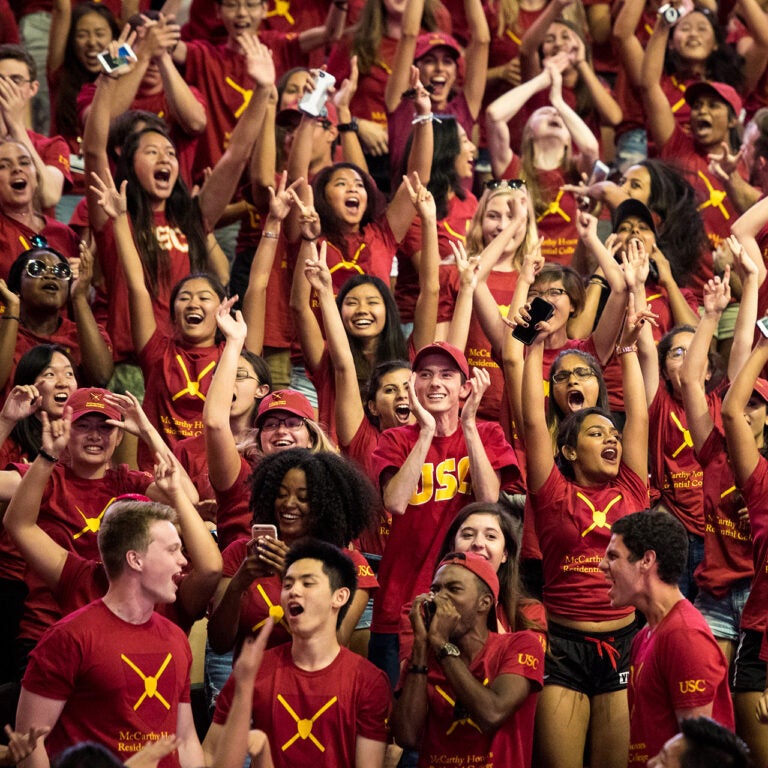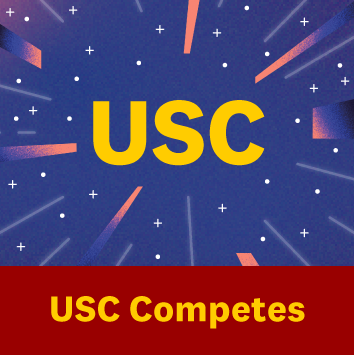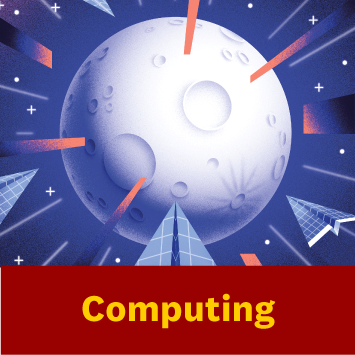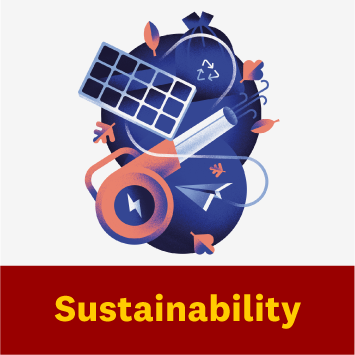USC President Carol Folt’s ambitious “moonshot” goals have helped cement the university’s position as a leader in advanced computing, health sciences, athletics and more. (Illustration/Daniele Simonelli)
University
Mission: Possible
When USC president Carol Folt outlined her ambitious “moonshot” plans, she knew they would make USC a top destination for students, faculty and staff seeking purpose-driven work, collaborative learning and innovative discovery.
USC President Carol Folt shared her vision for her “moonshots” at her first in-person State of the University address in 2022: “I see these as bold, comprehensive strategies for cross-institution collaboration in key areas.” By creating the roadmap for USC’s future and leveraging its unrivaled scale, size, breadth and excellence, Folt has set the university on the path to becoming America’s “school of schools.” Read on to learn just how much these ambitious initiatives have achieved.
FRONTIERS OF COMPUTING
The USC Frontiers of Computing initiative is a $1 billion-plus investment that builds on USC’s 50-year legacy of innovation, leveraging its leadership role in advanced computing research in artificial intelligence, machine learning and data science. It positions the university as an incubator for talent that can apply high- tech solutions to some of the world’s biggest challenges. The initiative calls for an infusion of artificial intelligence into all of the university’s schools to spark innovation, creativity and collaboration for the good of society.
-
- The university launched its 23rd school, the USC School of Advanced Computing, within the USC Viterbi School of Engineering. USC also plans a bigger footprint in Silicon Beach in the West L.A. area. Its offerings will also emphasize the importance of the ethics of technology, especially in the field of AI.
- USC is the No. 1 research university in the country in overall computer science degrees conferred.
- The initial $260 million investment for the moonshot included funds to hire new faculty, made possible because Folt reimagined a gift from the Lord Foundation of California; the Thomas Lord Department of Computer Science at the USC Viterbi School of Engineering was thus renamed.
- The USC Center for Generative AI and Society launched in 2023 to focus on USC’s leadership in the ethical use of generative AI in disparate disciplines — even the arts and education.
- USC + Amazon Center on Secure and Trusted Machine Learning supports research and new approaches to machine learning privacy and security.
- Dr. Allen and Charlotte Ginsburg Human-Centered Computation Hall houses the Thomas Lord Department of Computer Science and the USC School of Advanced Computing.
- The USC Marshall School of Business launched the Business of Blockchain Initiative to accelerate research, teaching and industry engagement in the field.
- Andrew Viterbi gave the USC School of Advanced Computing $10 million for the hiring of faculty and distinguished chairs.
- The School of Advanced Computing created an endowed chair in computer science and health, made possible by a $5 million gift from entrepreneur and philanthropist Mark A. Kolokotrones.
The world needs engineers and computer scientists to solve the grand challenges we face. The new school will tackle this goal by developing reimagined engineering curricula that also emphasize the ethics of technology in our fast-changing world.
— Dean of the USC Viterbi School of Engineering Yannis C. Yortsos
HEALTH SCIENCES 3.0 
Through the Health Sciences 3.0 moonshot, Folt created the Office of Health Affairs and hired physician-scientist Steven Shapiro as the first senior vice president for health affairs to supercharge collaboration among USC’s five health schools and its academic medical system, Keck Medicine of USC. The initiative also takes advantage of the AI revolution and collaborative care to overcome the greatest challenge of health care: providing improved outcomes at an affordable price.
By catalyzing groundbreaking, team-based research and education — in varied fields such as oncology, Alzheimer’s, aging, cardiac care and artificial intelligence — to tackle health care’s biggest challenges, the university’s health system has transformed care for USC’s surrounding communities and patients worldwide.
-
- The USC health enterprise saw significant growth during Folt’s tenure, including an eastward expansion with the 2022 acquisition of USC Arcadia Hospital in the San Gabriel Valley, transplant clinics in Las Vegas, and new clinical locations in Pasadena.
- In 2022, Folt directed $50 million from the Alfred E. Mann Foundation for Biomedical Engineering gift to name the USC Mann pharmacy school and $35 million to name the Mann department of biomedical engineering.
- A $50 million joint gift to USC and the University of California, San Diego, from the Epstein Family Foundation in 2022 supports existing Alzheimer’s research and accelerates collaborative efforts to discover effective therapies and a cure.The donation established the Epstein Family Alzheimer’s Research Collaboration at both universities and enabled the creation of the USC Alzheimer’s Therapeutic Research Institute.
- In 2024, the Weise family gave the Glendale Eye Medical Group to the USC Roski Eye Institute, expanding USC eye care services in the area. The gift established USC Roski Eye Institute-Glendale and brought six new faculty members to the institute, including ophthalmologists specializing in glaucoma, retina and comprehensive eye care, as well as three optometrists.
- Leonard D. Schaeffer and his wife, Pamela, have donated $59 million to establish the USC Leonard D. Schaeffer Institute for Public Policy & Government Service, which will expand two outstanding programs — the USC Schaeffer Center for Health Policy & Economics and the Leonard D. Schaeffer Fellows in Government Service.
- A $10 million gift from USC Trustee Mark Stevens and Mary Stevens, his wife, established the USC Mark and Mary Stevens Center for Orthobiologics to accelerate research into treatments for arthritis and joint injuries.
We are realizing the future of medicine with research-based inputs combined with AI, brilliant minds and compassionate caregivers to deliver tomorrow’s medicine today.
— USC Senior Vice President for Health Affairs Steven Shapiro
 SUSTAINABILITY
SUSTAINABILITY
USC’s Sustainability moonshot marshals the university’s research, teaching and community engagement efforts to create a healthy, just and thriving world.
USC has made substantial progress on sustainability since Folt became president in 2019. The president also created the Presidential Working Group on Sustainability in Education, Research, and Operations and hired the university’s first chief sustainability officer, Mick Dalrymple, in 2021 to optimize and grow the university’s sustainability efforts through collaboration across the USC community.
Folt’s campaign, Assignment: Earth, serves as a blueprint for action on sustainability across the university and promotes a more sustainable future.
-
- USC announced a new curriculum initiative designed to incorporate sustainability across disciplines. The university now offers more than 840 sustainability-related courses.
- When USC groundskeepers switched to electric-powered mowers, leaf blowers, hedge trimmers and chainsaws, the American Green Zone Alliance certified the USC University Park Campus as a “green zone” — the first campus in the country to earn the honor.
- In 2022, USC banned single-use plastic beverage bottles, keeping more than 5 million bottles out of landfills to date. Instead, Trojans fill up via hydration stations, water coolers/dispensers and water fountains.
- A new 1,500-square-foot Sustainability Hub at the University Park Campus opened in 2023 to become home to Assignment: Earth and other sustainability projects. It was also where the inaugural Presidential Sustainability Fellows were announced — postdoctoral researchers who pursue multidisciplinary projects and work out of the hub.
- The President’s Sustainability Internship Program currently provides 19 students with real-world work experience applying their classroom education to develop operational sustainability solutions using the USC campuses as living labs.
- Every year starting in 2021, USC has earned a silver rating or higher in its Sustainability Tracking, Assessment and Rating System (STARS) report, a benchmark for more than 1,000 U.S. colleges and universities, tracking how institutions address the environmental, social and economic aspects of sustainability. USC earned a gold rating in 2024.
- Keck Medicine of USC practitioners have overhauled procedures in operating rooms to significantly reduce the use of anesthetics that harm the environment and replace disposable devices and materials with reusable alternatives when possible.
- USC professors not only study sustainable solutions but have also incorporated more sustainable processes, materials and equipment into their work. This includes techniques by scientists at the USC Dornsife College of Letters, Arts and Sciences to make chemical research labs greener and more energy efficient by using safer chemicals, preventing pollution and properly disposing of waste.
- The USC Urban Trees Initiative, with support from the Bezos Earth Fund, brings the Trojan community together to make strategic decisions about building a resilient urban forest in L.A.
- USC decreased water usage by 25% by installing meters at the University Park and Health Sciences campuses and fixing leaks on a quicker timeline.
- USC has reduced greenhouse gases on both campuses by 50% since 2014.
- USC has increased campuswide waste diversion to 54%; USC Hospitality has increased the amount of food purchased from sustainable sources to 55%; and the university reduced its lighting load by 60% by switching to energy-efficient LED lighting.
- In 2024, the USC Wrigley Institute for Environment and Sustainability received a $4 million commitment from Ballmer Group to launch a new initiative focused on climate and carbon management.
As an anchor institution in L.A. with global reach and impact, USC has an opportunity and obligation to research and develop interdisciplinary sustainable solutions, to equip students with the tools to weave those solutions through- out society in their chosen field, and to practice those solutions within our own campuses.
— USC Chief Sustainability Officer Mick Dalrymple
 REIMAGINING ATHLETICS
REIMAGINING ATHLETICS
The Reimagining Athletics moonshot empowers student-athletes across the university’s 23 sports programs to compete with integrity at the highest level athletically and in the classroom. The initiative — which builds on the current success of Trojan athletic programs — aims to improve USC’s facilities and maximize space use through innovative planning. Under Folt, USC has experienced its most transformational era of investment in athletics facilities upgrades in the university’s history.
-
- The moonshot was announced as the university made its historic move to the Big Ten Conference in 2024, which meant additional resources and nationwide exposure for Trojans.
- Faculty, staff and students now benefit from being part of the 18-member Big Ten Academic Alliance, which facilitates the sharing of resources, infrastructure and expertise.
- The moonshot has provided first-in-class academic support through key hires, doubled the number of sport psychology clinicians, integrated athletic medicine through Keck Medicine of USC and improved nutritional offerings given to student-athletes. The university also launched the Trojan Enrichment Program, which allows the maximum amount of education-related financial support to all student-athletes.
- USC’s student-athlete graduation success rate was 94% in 2024, the highest in school history. Thirteen of the university’s sports programs had a rate of 100% during that time.
- Colich Track and Field Center opened in 2021 as the new home of the men’s and women’s track and field programs, including a Hall of Fame showcasing the programs’ impressive success in NCAA championships and the Olympics.
- Allyson Felix Field was renamed in 2023.
- Rawlinson Stadium was established for the USC women’s lacrosse and soccer teams in 2023 after a gift from the Fritz B. Burns Foundation was paired with support from Folt’s presidential fund and other donors.
- USC completed an 18-month, $315 million renovation of the L.A. Memorial Coliseum during Folt’s tenure.The significant remodeling includes a state-of-the-art press box, new seats throughout the stadium and an updated locker room for the home team.
- A $50 million gift from the Ronald H. Bloom family in late 2024 brought investments in athletics facilities during Folt’s presidency to more than $200 million so far.The gift will fund the Bloom Football Performance Center.
- Folt commissioned a makeover of the Galen Center in 2024 to enhance the game day experience.
- Dedeaux Field, the home of USC baseball, will see significant enhancements, including upgraded capacity, a team meeting space, a brand-new press box, coaching and support staff offices, and fan experience enhancements.
- The John McKay Center will receive future innovations for all student-athletes, including an expanded dining facility and an upgraded golf practice facility.
Being a member of the Big Ten will enable us to further invest in the student-athlete experience by providing us with additional resources; to create exciting new rivalries with like-minded institutions; to celebrate and share our storied traditions with Trojans across the country and with new generations of fans; and to provide our student-athletes and university with unprecedented national exposure and opportunities.
— USC Athletic Director Jen Cohen
USC COMPETES
The USC Competes moonshot allows USC to recruit, retain and support students, faculty and staff. By becoming a national leader in accessibility, affordability and debt reduction, the university can draw the best and brightest students to thrive and reach their academic, professional and personal dreams. USC Competes also encapsulates the university’s goal to lead in progress and innovation.
-
- Within three months of her tenure at USC, Folt established her Affordability Initiative.
- In the last six years, USC saw 69 faculty inducted into the national academies of medicine, engineering, sciences, inventors and education, as well as the American Academy of Arts and Sciences.
- In 2023, the university launched Advise USC, which enables all academic advisors across USC’s 23 schools to use the same system, ensuring students receive consistent guidance throughout their time at USC.
- The President’s High-Tech Scholars Program, which was launched with support from the Sherman Fairchild Foundation, as well as Oscar Munoz and Kathy Leventhal, helps tech-interested transfer students from local community colleges thrive at USC through developmental opportunities such as mentorship and a Summer Launchpad Program to support the transition to a four-year university.
- The university launched the Care for the Caregiver program during the COVID-19 pandemic to offer safe places for people to stay while working long hours. This program still exists and provided safety for some Trojans during the January 2025 wildfires.
- The USC Capital Campus expanded the university’s presence and influence in Washington, D.C., in 2023, allowing Trojan students, researchers and alumni to connect and build relationships with the country’s decision-makers. USC has already hosted more than 300 events and conferences since it opened the 60,000-square-foot building.
- Also in 2023, the university joined an exclusive group of just 13 private universities nationwide to surpass $1 billion in annual research expenditures. Folt said during her March 2023 State of the University address that the university has experienced a 44% growth in research spending since 2019, amounting to $1.26 billion in 2024 — a historic high for USC.
- In 2024, Folt led a USC delegation on a three-city tour of India, dubbed “USC-India: Partner the Future.”
We start with our overarching goal — to increase the stature and impact of USC, by making USC the international standard-bearer and innovator for collaborative learning and discovery, and making USC the top choice for students, faculty and staff who seek purpose-driven work and lives.
— USC President Carol Folt at the 2022 State of the University address
 USC ARTS NOW INITIATIVE
USC ARTS NOW INITIATIVE
For decades, faculty, staff and students at USC’s six conservatory-level arts schools and its two museums have contributed to a vibrant environment of creative expression on campus. In 2024, Folt launched the USC Arts Now moonshot to support new, unexpected collaborations throughout the university and connect the arts to every discipline across USC’s campuses.
She also named Josh Kun, professor at the USC Annenberg School for Communication and Journalism and chair in cross-cultural communication, as USC’s inaugural vice provost for the arts, working with USC’s arts deans and USC Museums on partnerships and collaborations across campuses and the greater Los Angeles community that activate the arts and raise Trojan visibility.
-
- Leaders from USC’s arts schools and museums form the backbone of the USC Arts Council to inform the direction of the USC Arts Now initiative. Leaders from the Keck School of Medicine of USC, the USC Center for Generative AI and Society and the USC Arts and Climate Collective are also part of the council.
- Last year, Kun worked with the Keck School of Medicine to bring USC deans and faculty together to explore collaborations between the arts and health sciences.
- In 2024, the USC Arts Now initiative held “Beyond the Human?: From the Metaphysical to the Physical,” co-curated by Kun and renowned artist Cai Guo-Qiang. USC Visions and Voices and the USC Center for Generative AI and Society co-sponsored the event.
- In November, Emmy-winning producer Dick Wolf gave a significant contribution to the USC School of Dramatic Arts.
- In April, USC Arts Now and the USC Thornton School of Music presented a symposium on the pivotal role artists play in responding to crises such as the Los Angeles wildfires.
USC Arts Now focuses on the arts as an interface, as a place of connection between different bodies of thought, different systems of knowing and different disciplines in different fields.
— USC Vice Provost for the Arts Josh Kun









